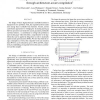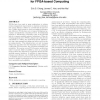517 search results - page 10 / 104 » The design of a low energy FPGA |
GLVLSI
2007
IEEE
14 years 1 months ago
2007
IEEE
Energy consumption is a major concern in embedded computing systems. Several studies have shown that cache memories account for about 40% or more of the total energy consumed in t...
SASP
2008
IEEE
14 years 1 months ago
2008
IEEE
This paper proposes an energy efficient processor which can be used as a design alternative for the dynamic voltage scaling (DVS) processors in embedded system design. The proces...
ASPDAC
2004
ACM
14 years 23 days ago
2004
ACM
The design of future high-performance embedded systems is hampered by two problems: First, the required hardware needs more energy than is available from batteries. Second, curren...
FPGA
2011
ACM
12 years 10 months ago
2011
ACM
FPGAs have been used in many applications to achieve orders-of-magnitude improvement in absolute performance and energy efficiency relative to conventional microprocessors. Despit...
ISSS
2002
IEEE
14 years 8 days ago
2002
IEEE
We propose a high-level analytical model for estimating the energy and/or power dissipation in VLSI processor (systolic) array implementations of loop programs, particularly for i...



